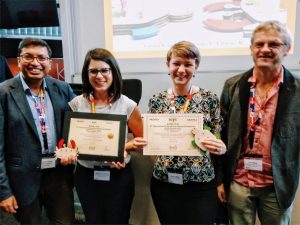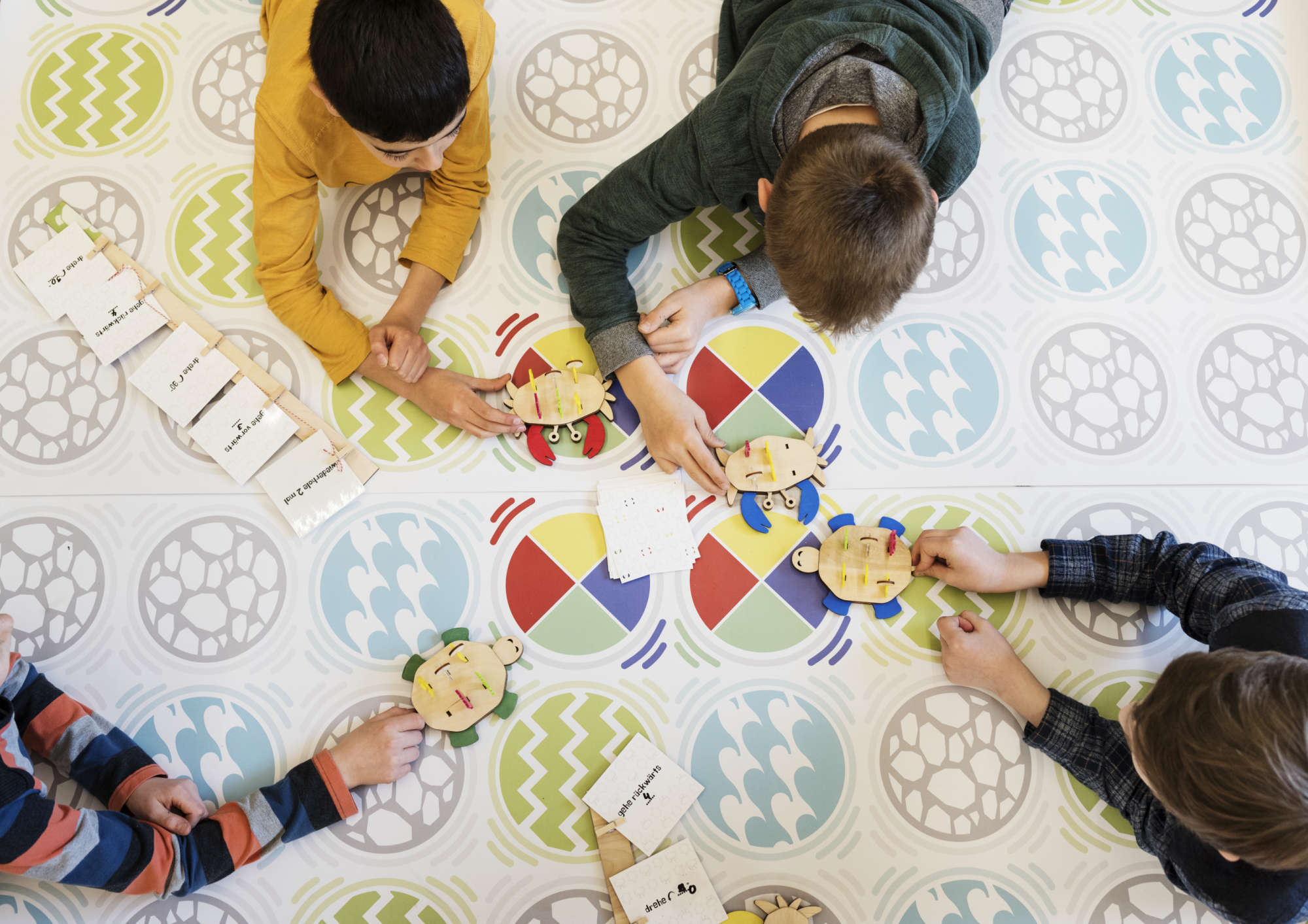This is the webpage of the life-size board games Crabs & Turtles: A Series of Computational Adventures. Here you can find information regarding the aim and the structure of the games. You can also keep up with the research being done with the games and contact us!
About
Crabs & Turtles: A Series of Computational Adventures is a life-size board-game that aims at providing an unplugged and low-threshold introduction to computational thinking. In particular, the games aim at introducing basic coding concepts and computational thinking processes to primary school children. Crabs & Turtles consists of three different games:
i. The Treasure Hunt, ii. The Race, and iii. Patterns.
Currently, all three games are available in English, German (“Schildkröten & Krabben”) and Greek (“Χελώνες & Κάβουρες”).
Crabs & Turtles share common ideas with concepts of the educational Logo-Turtle and Logo-inspired games and gamified educational activities. The life-size dimensions of the games allow playability within the classroom or open-air spaces. The chosen un-plugged mode takes into account common concerns on introducing coding to primary school children and offers a smooth and children friendly transition to digital more complex educational programming environments. Moreover, we feel that using a non-digital mode is crucial because it fosters the experience that possible applications of coding concepts and CT processes are not restricted to digital contexts but also generalize to real-life conditions.
The games can be used as a standalone game interventions however, they are intended to be part of a structured course curriculum currently offered in several Hector Children’s Academies in Baden-Württemberg which builds upon skills acquired within the game.
Research
Recent research contributions related to Crabs & Turtles:
- Tsarava, K., Moeller, K., & Ninaus, M. (in press). Board Games for Training Computational Thinking. Proceedings of Games and Learning Alliance conference (GALA 2018) – Lecture Notes in Computer Science. Springer.
- Tsarava, K., Moeller, K., & Ninaus, M. (2018). Training Computational Thinking through board games: The case of Crabs & Turtles. International Journal of Serious Games, 5(2), 25-44. https://dx.doi.org/10.17083/ijsg.v5i2.248
- Tsarava, K., Moeller, K., Pinkwart, N., Butz, M., Trautwein, U., & Ninaus, M. (2017). Training computational thinking: Game-based unplugged and plugged-in activities in primary school. Proceedings of the 11th European Conference on Game Based Learning (pp. 687-695). Reading, UK: Academic Conferences and Publishing International Limited.
- Tsarava, K., Moeller, K., & Ninaus, M. (2018, December). Board Games for Training Computational Thinking. 7th International Games and Learning Alliance conference – GALA2018. Palermo, Italy. [Talk]
- Tsarava, K., Leifheit, L., Moeller, K., & Ninaus, M. (2018, October). “Crabs & Turtles: A Series of Computational Adventures” 12th European Conference on Game Based Learning. Sophia Antipolis, France. [Talk]
- Tsarava, K., Moeller, K., Pinkwart, N., Butz, M., Trautwein, U., & Ninaus, M. (2017, October). Training computational thinking: Game-based unplugged and plugged-in activities in primary school. 11th European Conference on Game Based Learning. Graz, Österreich. [Talk]
- Tsarava, K., Moeller, K., & Ninaus, M. (2018, July). Design and Game-Experience Evaluation of Three Games to Foster Computational Thinking. 2nd Virtual Environments: Current TOpics in Psychological Research (VECTOR) workshop 2018. [Poster]
News
2018-10-16 | INTERNATIONAL EDUCATIONAL GAMES COMPETITION: 1ST PRIZE FOR “CRABS & TURTLES” BY KATERINA TSARAVA AND LUZIA LEIFHEIT.

Katerina Tsarava of the Leibniz-Institut für Wissensmedien (IWM) and Luzia Leifheit of the LEAD Graduate School won the the 1st prize in the category of non-digital games and the joint overall 1st prize of the competition at the 6thInternational Educational Games Competition for their board game series “Crabs & Turtles: A Series for Computational Adventures” on October 4 and 5. The competition was part of the 12th European Conference on Games Based Learning at SKEMA Business School in Sophia Antipolis, France.
The life-size board game series “Crabs & Turtles” were developed at the IWM in the junior research group Neurocognitive Plasticity by Tsarava and Leifheit. It is aiming to train computational thinking skills to primary school children like algorithmic thinking, sequences, loops, constants, variables, etc. in a low-threshold manner. The games are integrated into the structured course curriculum “Verstehen wie Computer denken” (Understanding how computers think) of the Hector Children Academies, in which primary school students learn informatics concepts in a playful manner and apply their acquired skills at programming afterwards. The project is funded by the Hector Stiftung II and the courses are offered in more than 20 Hector Children Academies in Baden-Württemberg since October 2018.
2018-04-04 | HOW CRABS AND TURTLES SUPPORT COMPUTATIONAL THINKING
Wooden turtles, colourful plugs and a treasure – Ph.D. student Katerina Tsarava of the project group Neuro-cognitive Plasticity of the Leibniz-Institut für Wissensmedien (IWM) plays for science.
With her life-size board game “Crabs and Turtles”, Katerina Tsarava examines how the game environment affects the computational thinking development of children between 8 and 9 years. In the game children solve math related tasks with variables or have to figure out the most efficient way to collect treasures by creating effective sequences of commands which is similar to coding concepts. By doing so, computational thinking related skills are trained like abstraction, pattern recognition and decomposition.
“Games or game-based applications are an increasingly important mechanism for cognitive training, learning and educational interventions because of their ability to keep players motivated to play and to interact with the application or learning environment, respectively,” says Tsavara. Recent research even indicates that game-based learning is more effective in terms of learning and retention than conventional instruction methods.
In her Master thesis project, Tsavara has already studied computational thinking and designed a life-size board game for teaching students basic programming skills. Her current game was further developed and integrated into a new Core Course (“Verstehen wie Computer denken”) of the Hector Kinderakademie in collaboration with Luzia Leifheit from the LEAD Graduate School. The game was tested so far in a Student Enrichment Center in Thessaloniki, at the Kinderakademie of the Hector Institut fuer Empirische Forschungsbildung in Tuebingen (Wanne) and in several beta-test playing sessions at the IWM. The upcoming months, Katerina Tsavara and Luzia Leifheit will apply “Crabs and Turtles” in other Hector Kinderakademien in Baden-Wuertemberg (inter alia in Reutlingen, Nuertingen and Lossburg).
Contact

Junior Research Group Neuro-cognitive Plasticity
Prof. Dr. Korbinian Möller
k.moeller(aτ)iwm-tuebingen.de
Katerina Tsarava
k.tsarava(aτ)iwm-tuebingen.de
Schleichstraße 6
72076 Tübingen
Germany
